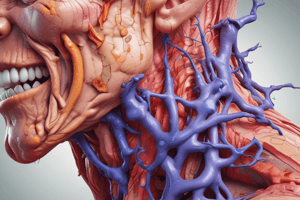Podcast
Questions and Answers
What is the primary issue in lupus?
What is the primary issue in lupus?
- The body produces too many antibodies.
- Environmental factors overwhelm the immune system.
- Genetic predisposition leads to hormone imbalance.
- The immune system attacks the body itself. (correct)
Which factor increases the likelihood of developing lupus?
Which factor increases the likelihood of developing lupus?
- Increasing age
- Being male
- Having a family history of autoimmune diseases (correct)
- Living in rural areas
What is a key hormonal factor associated with lupus?
What is a key hormonal factor associated with lupus?
- Insulin sensitivity
- Testosterone levels
- Estrogen and prolactin levels (correct)
- Thyroid hormone levels
What environmental factor may contribute to the onset of lupus?
What environmental factor may contribute to the onset of lupus?
Which demographic has a higher prevalence of lupus?
Which demographic has a higher prevalence of lupus?
What are some common symptoms of lupus?
What are some common symptoms of lupus?
Which of the following is a type of medication used to manage lupus?
Which of the following is a type of medication used to manage lupus?
What factor is mentioned as having a higher occurrence of lupus in women?
What factor is mentioned as having a higher occurrence of lupus in women?
Which of the following is NOT a consequence of untreated lupus?
Which of the following is NOT a consequence of untreated lupus?
What is a recommended characteristic of the lupus support group mentioned?
What is a recommended characteristic of the lupus support group mentioned?
Lupus occurs when the body's immune system attacks itself.
Lupus occurs when the body's immune system attacks itself.
Lupus is less common in women compared to men.
Lupus is less common in women compared to men.
Exposure to sunlight can trigger lupus symptoms in some individuals.
Exposure to sunlight can trigger lupus symptoms in some individuals.
Hormones such as estrogen and prolactin play no role in the development of lupus.
Hormones such as estrogen and prolactin play no role in the development of lupus.
Genetics can increase the chance of developing lupus by 20%.
Genetics can increase the chance of developing lupus by 20%.
Women have a lower chance of developing lupus than men.
Women have a lower chance of developing lupus than men.
Medication is used to suppress the immune system in lupus treatment.
Medication is used to suppress the immune system in lupus treatment.
The malar rash associated with lupus appears only on the chest.
The malar rash associated with lupus appears only on the chest.
NSAIDs are used to control pain and inflammation in lupus treatment.
NSAIDs are used to control pain and inflammation in lupus treatment.
All individuals with lupus will experience kidney damage.
All individuals with lupus will experience kidney damage.
Flashcards
Lupus
Lupus
A condition where your body's immune system mistakenly attacks its own tissues and organs.
What triggers Lupus?
What triggers Lupus?
Lupus is triggered by a combination of factors, including genetics, race, hormones, exposure to viruses, sunlight, certain medications, and smoking.
Genetic Predisposition
Genetic Predisposition
Having a higher risk of developing Lupus due to inheriting specific genes.
Hormones and Lupus
Hormones and Lupus
Signup and view all the flashcards
Lupus and Race
Lupus and Race
Signup and view all the flashcards
Causes of Lupus
Causes of Lupus
Signup and view all the flashcards
Lupus Symptoms
Lupus Symptoms
Signup and view all the flashcards
Treating Lupus
Treating Lupus
Signup and view all the flashcards
Living with Lupus
Living with Lupus
Signup and view all the flashcards
Genetic Predisposition to Lupus?
Genetic Predisposition to Lupus?
Signup and view all the flashcards
Environmental Factors and Lupus
Environmental Factors and Lupus
Signup and view all the flashcards
What is Lupus?
What is Lupus?
Signup and view all the flashcards
Who is more likely to get Lupus?
Who is more likely to get Lupus?
Signup and view all the flashcards
Common Lupus symptoms
Common Lupus symptoms
Signup and view all the flashcards
How is Lupus treated?
How is Lupus treated?
Signup and view all the flashcards
Study Notes
Lupus Overview
- Lupus is an autoimmune disease where the body's immune system attacks itself.
- Lupus affects approximately 5 million people worldwide.
- May is Lupus Awareness Month.
- Lupus is not contagious, it's not associated with HIV/AIDS or cancer.
- There's no single blood test to diagnose lupus.
- Lupus classification includes 6 classes.
- Proper care allows a full life for people with lupus.
- Lupus can mimic other diseases because it is a great imitator.
- 90% of people with lupus are women.
Causes of Lupus
-
Genetics: A 20% higher chance if lupus is present in the genes; this involves a combination of genes that make someone more susceptible, and a lack of protective genes.
-
Race: Lupus is more common in women of colour.
-
Hormones: Women produce more estrogen, and prolactin throws a certain inflammatory pathway off balance.
-
Environment: Exposure to viral infections, sunlight, certain medications, and smoking.
Symptoms of Lupus
- A skin rash, called a malar or "butterfly" rash, appearing on the face across the nose and cheeks.
Treatment for Lupus
-
1. Medication to suppress the immune system
-
2. NSAIDs (Nonsteroidal anti-inflammatory drugs) to control pain and inflammation.
-
3. Antimalarial drugs to reduce lupus flares.
-
4. Corticosteroids to control inflammation.
-
5. Immunosuppressants for severe cases.
-
People with lupus can live healthy and mostly normal lives if they take treatment. Possible complications include kidney damage, seizures, memory problems, heart problems, blood clots, low blood cell count, and inflammation of tissues and blood vessels.
Possible Disabilities Associated with Lupus
- Vision loss
- Hearing loss
- Fibromyalgia
- Heart conditions
- Depression
- Diabetes
Support Groups
- Lupus SK Society Inc.: Located in Saskatoon, SK, Canada. They offer in-person support and online resources.
- LupusConnect: Offers online forums, in-person meetings, and access to health professionals. LupusConnect is located in Washington, D.C.
- Lupus Warriors: This group is a Facebook forum.
- Kaleidoscope Fighting Lupus: Offers in-person meetings and resources to help find a cure.
Studying That Suits You
Use AI to generate personalized quizzes and flashcards to suit your learning preferences.




